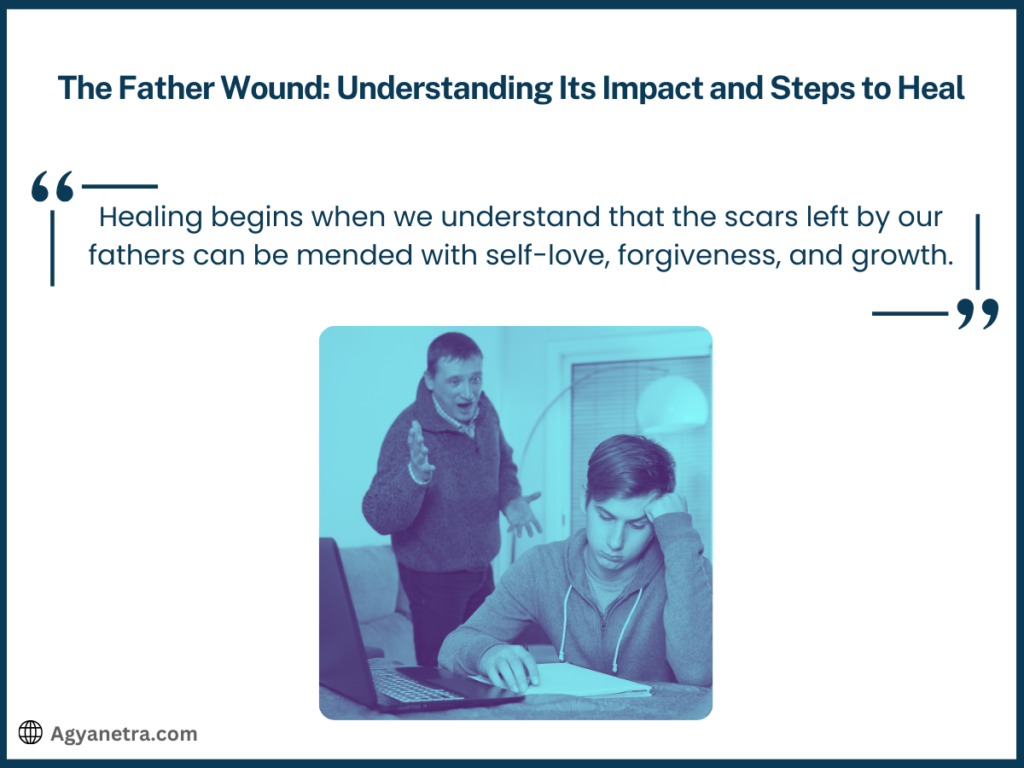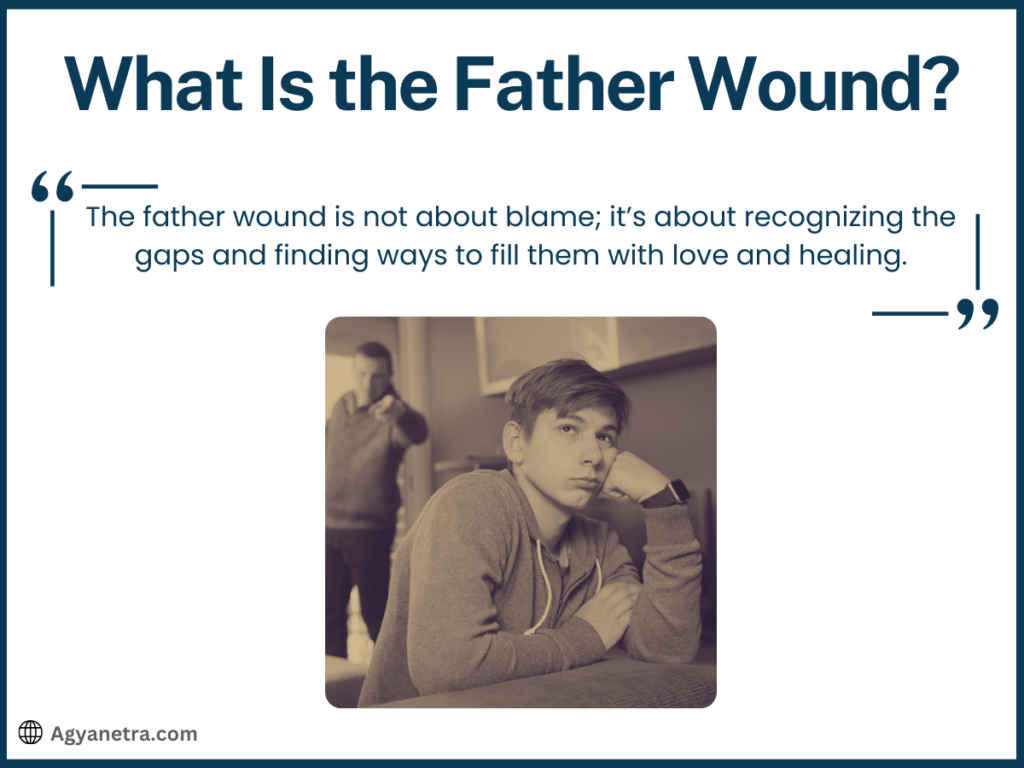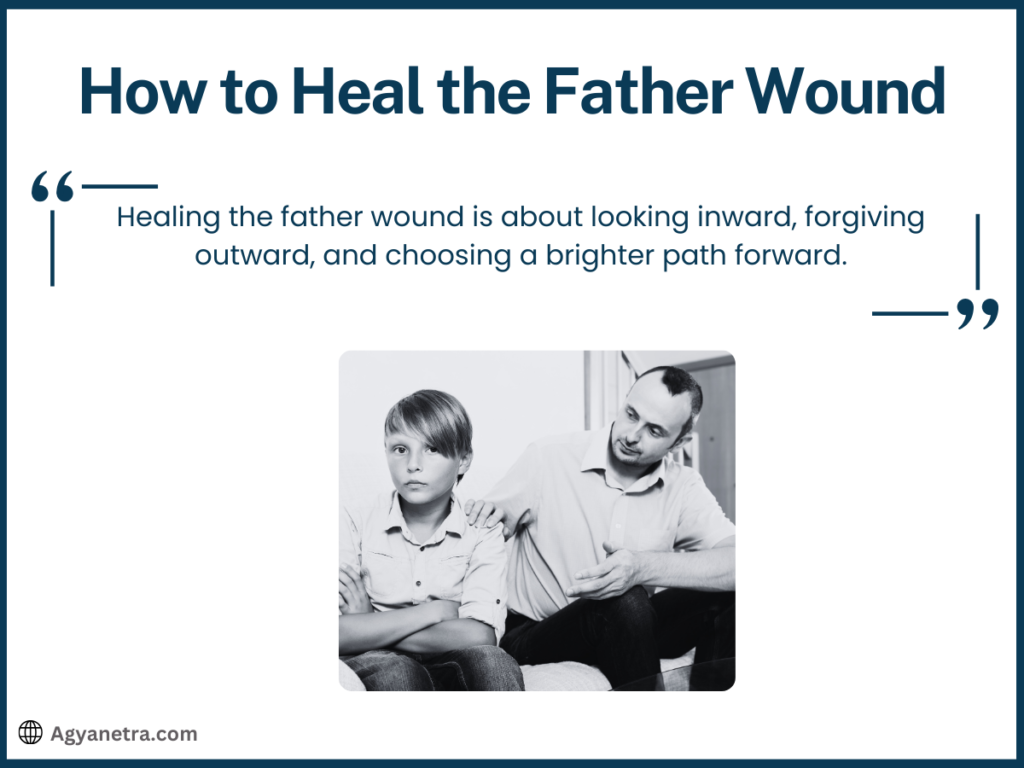What is the Father Wound? is a topic that touches the emotional core of many lives. Have you ever wondered how the absence or behavior of a father can leave lasting impressions on a child’s heart?
These impressions often shape who we become, influencing our relationships, confidence, and emotional well-being.
In this article, we’ll explore what the father wound really means, how it affects both sons and daughters, and, most importantly, how you can begin to heal. If you’re seeking clarity and hope, you’re in the right place—let’s dive deeper.
What is the Father Wound? Understanding Its Impact and Steps to Heal
Parenthood is a shared journey where both parents play vital roles in raising emotionally healthy children. However, fathers often take a backseat in this process, leaving a significant gap in a child’s emotional development.

When a father is absent—physically, emotionally, or both—a deep emotional scar known as “The Father Wound” can form.
This wound can have long-lasting effects, shaping the child’s personality, relationships, and even self-worth.
we’ll see what the father wound is, how to recognize its signs, the impact it can have on sons and daughters, and practical ways to heal.
Whether you’ve experienced this personally or want to understand it better, this guide will offer insights and actionable steps to help you move forward.
What Is the Father Wound? ( Real meaning)
The father wound refers to the emotional pain or unmet needs caused by a father’s absence, neglect, or harmful behavior.
It can stem from many circumstances, such as a father’s physical absence due to death, divorce, or work commitments, or emotional unavailability due to being overly critical, abusive, or indifferent.

The wound often leaves children feeling abandoned, unworthy, or unsupported, which may carry over into adulthood.
For instance, imagine a father who is always away for work and rarely spends time with his child.
Even though his absence might be unintentional, the child could grow up feeling unloved or insignificant.
Similarly, a father who is overly controlling or critical might make the child feel inadequate or afraid of failure. Over time, these experiences shape the child’s emotional world, often leading to the patterns we’ll discuss next.
More Posts Like This:
- The Importance of Fatherhood
- The Impact of Emotional Neglect: Signs of Mother’s and Father’s Wounds
- The Importance of Addressing Childhood Issues
- Understanding Depression: Breaking Stigmas and Finding Hope
5 Important Signs of the Father Wound
Recognizing the signs of the father wound is the first step toward healing. These signs often manifest in behaviors, emotions, and thought patterns that persist into adulthood.
1. Self-Criticism
Children with a father wound often grow up being overly self-critical. They may feel they are never good enough and strive for perfection to gain approval or acceptance.
For example, a young man who didn’t receive praise from his father might push himself excessively in his career, constantly seeking validation from others.
2. Fear of Abandonment
A common sign is the fear of being abandoned, whether in romantic relationships or friendships.
Such individuals may go out of their way to avoid conflicts, adopt people-pleasing behaviors, and hide their true selves to maintain connections.
3. Lack of Connection with Father
A child with a father wound may feel distant or even fearful of their father. Instead of seeing him as a source of love and support, they may view him as a figure of criticism or indifference, which creates a lack of emotional bonding.
4. Social Withdrawal
Some individuals withdraw from social interactions entirely, fearing emotional hurt or rejection. They may avoid forming close relationships, preferring to keep people at a distance.
5. Overcompensation in Relationships
Many people with a father wound try to compensate for the emotional gap by taking on a caregiver role in friendships or romantic relationships.
For instance, a woman might become overly nurturing toward her partner, trying to fill the void left by her father.
How the Father Wound Affects Relationships?
The father wound doesn’t stay confined to childhood—it often carries over into adult relationships, shaping how individuals connect with others.
1. Acceptance of Abusive Behavior
Those with a father wound might tolerate abusive or unhealthy behavior because they’ve normalized it. For example, a person who grew up witnessing aggression from their father might believe it’s a standard part of relationships.
2. Trust Issues
Trust doesn’t come easily for individuals with a father wound. They may hesitate to open up fully in relationships, fearing betrayal or abandonment.
3. Clingy Behavior
A fear of being left alone often leads to clinginess in relationships. They might constantly seek reassurance from their partner, wanting to feel secure and valued.
4. Shallow Emotional Connections
Some individuals may avoid deep emotional connections altogether, engaging in relationships that are surface-level and lack genuine intimacy.
5. Need for Reassurance
Frequent reassurance becomes a coping mechanism. For example, someone might repeatedly ask their partner if they love them or if they’re happy in the relationship, seeking comfort and validation.
How does a father wound affect son?
The father wound manifests uniquely in sons, often affecting their self-esteem and identity.
Sons might grow up feeling that they are not good enough or struggle to find their place in the world.
They might develop a constant need to prove their worth through achievements or take on hyper-masculine roles to mask their vulnerabilities.
For instance, a son might secretly yearn for a father figure while simultaneously harboring anger or resentment toward his father.
This internal conflict can lead to struggles with authority figures or difficulties in maintaining healthy relationships.
Sons with a father wound should focus on breaking the cycle. By becoming emotionally available fathers themselves, they can ensure their children don’t face the same challenges.
How does a father wound affect Daughter?
For daughters, the father wound often affects their self-confidence and the way they view men.
A daughter might grow up craving her father’s love and approval, and in its absence, she might seek it in unhealthy relationships.
For instance, a woman might unconsciously choose partners who mimic her father’s negative traits, believing this is the norm.
Daughters with a father wound may also struggle with trust, intimacy, or anxious attachment styles.
Choosing supportive, emotionally secure partners can help overcome these challenges and foster healthier relationships.
How to Heal the Father Wound? (8 Ways)
Healing the father wound requires self-awareness, acceptance, and actionable steps. While the process may take time, it can lead to a more fulfilling and emotionally balanced life.

1. Accept the Wound
The first step is acknowledging the presence of the father wound. Denial only delays healing, while acceptance opens the door to growth.
2. Forgive Your Father
Forgiveness doesn’t mean condoning harmful behavior—it’s about freeing yourself from the emotional burden. Understand that your father might have had his own struggles and limitations.
3. Open Communication
If possible, try to have an honest conversation with your father. Sharing your feelings can help address unresolved issues and foster understanding.
4. Parent Your Inner Child
Offer yourself the love and reassurance you lacked during childhood. For example, practice self-compassion by speaking kindly to yourself and recognizing your worth.
5. Practice Mindfulness
Techniques like meditation and deep breathing can help you process painful memories and stay grounded in the present.
6. Pursue Hobbies
Engaging in activities you love, such as gardening, painting, or reading, can provide emotional relief and a sense of purpose.
7. Focus on Strengths
Shift your focus to your strengths and accomplishments. Remind yourself that you are deserving of love and success.
8. Seek Professional Help
In severe cases, therapy can provide the tools and support needed to navigate deep-seated emotional wounds. A trained therapist can guide you through the healing process.
Conclusion
The bond between a child and their father plays a crucial role in shaping their emotional well-being.
When this bond is fractured, it leaves a father wound that can influence personality, relationships, and self-worth.
However, by acknowledging the wound, forgiving the past, and taking proactive steps to heal, it is possible to break free from its hold and build a brighter future.
Remember, healing is a journey, and every step you take brings you closer to a healthier, happier version of yourself.
FAQs
What is the father wound?
The father wound refers to emotional pain or unmet needs caused by a father’s absence, neglect, or harmful behavior. It can result from physical absence, emotional unavailability, or abusive actions, leaving lasting effects on a child’s personality, relationships, and emotional health.
How does the father wound affect relationships?
The father wound can cause trust issues, fear of abandonment, and difficulty forming deep emotional connections. It may lead to clingy behavior, shallow relationships, or tolerating abusive behavior due to normalized patterns from childhood.
What are common signs of the father wound?
Common signs include:
Overly self-critical behavior
Fear of abandonment
Social withdrawal
Lack of connection with the father
Overcompensating in relationships by taking on a caregiver role
How can mindfulness help heal the father wound?
Mindfulness practices like meditation and deep breathing can help process painful memories, reduce emotional stress, and keep you grounded in the present, promoting emotional healing and resilience.
Why is forgiveness important in healing the father wound?
Forgiving your father allows you to release emotional pain and move forward. It doesn’t mean condoning harmful behavior but helps you let go of resentment and focus on personal growth and healing.

Vidushi Gupta is a certified spiritual coach, energy healer, and emotional wellness counselor with over 10 years of experience guiding people through spiritual signs, emotional healing, and inner transformation. Her approach is grounded, fear-free, and focused on helping readers understand spiritual experiences with clarity and emotional balance.
With a background as a digital content strategist and published author of nearly ten novels, Vidushi has reached over 20 million readers worldwide through her writing. She is known for explaining complex spiritual ideas in simple, relatable language, making topics like repeating signs, intuitive shifts, and spiritual awakenings easier to understand and trust.
Through her work, she helps people connect everyday life experiences to deeper inner growth—gently, honestly, and without superstition.
Accuracy, Fact-Checking & Expert Oversight: Vidushi Gupta.
